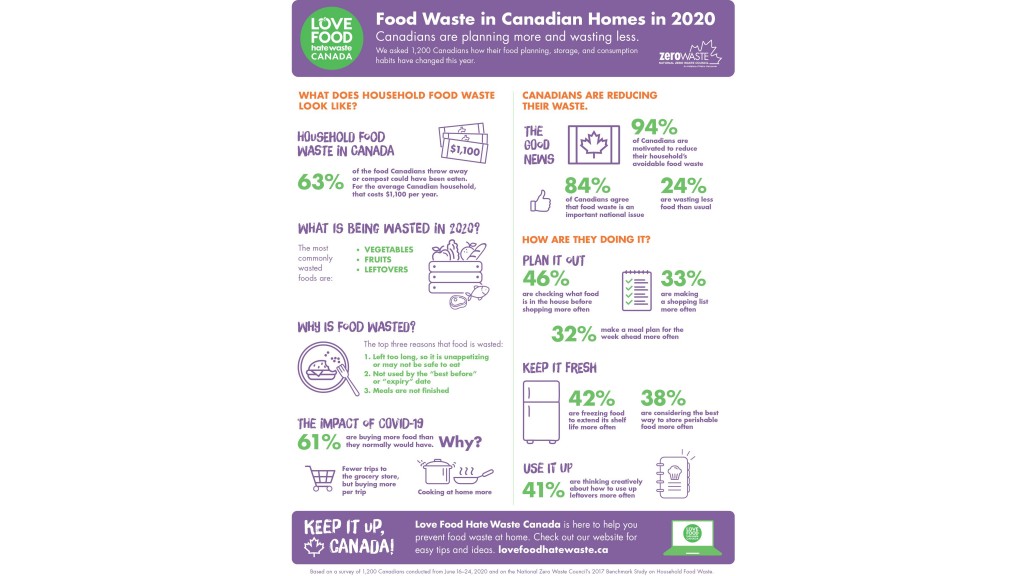
A new nation-wide survey shows that Canadians are wasting less food while COVID-19 public health measures have been in place. Love Food Hate Waste Canada, delivered by the National Zero Waste Council in conjunction with its campaign partners, worked with the Mustel Group to understand how food purchasing, storage, consumption and waste behaviours have changed since the introduction of quarantine and physical distancing measures.
The online survey of 1,200 randomly-selected adult Canadians found that while people are buying more food overall, 24% of households are throwing away or composting less uneaten food and 94% of Canadians are motivated to reduce their household's avoidable food waste.
Since the introduction of public health measures in response to the COVID-19 pandemic, 63% of Canadians are shopping less often, but are buying more food per trip than before. More households are adopting food-saving habits, especially checking what food is already in the house, freezing foods to extend shelf life, and getting creative with leftovers.
"This new research confirms that Canadians are thinking about making the most of the food they buy. We know that 84% of Canadians believe that everyone has a responsibility to prevent avoidable food waste in their households," said Malcolm Brodie, Chair of the National Zero Waste Council. "We are excited to build on this momentum and support Canadians with the tools, insights, and resources they need to make preventing food waste in the home the new normal."
"Nurturing the families of today and protecting the families of tomorrow is a key priority for us. This research shows that our customers are highly motivated to reduce waste, which is why as part of our sustainability strategy, we are on a mission to reduce food waste in our operations by 50% by 2025," said Vittoria Varalli, Vice President of Sustainability at Sobeys Inc. "We are working with partners like Love Food Hate Waste to find innovative solutions to help us reach this goal."
"As a partner in Love Food Hate Waste Canada, the City of Vancouver is encouraged by the results of the food waste survey," said Albert Shamess, Director, Zero Waste and Resource Recovery, City of Vancouver. "The numbers show that Canadians across the country have adopted important food-saving behaviours in response to the pandemic. We look forward to supporting Vancouver residents to help them reinforce these new habits and build upon them as we work collectively towards reducing avoidable food waste and meeting our Zero Waste 2040 goals."
"The study highlights the importance of giving Quebecers who are looking for sources of information the tools they need to actively participate in the fight against food waste," said Sonia Gagné, CEO of RECYC- QUÉBEC. "The majority of the Quebec population, namely 83%, is motivated and ready to be part of the solution. This demonstrates the relevance of conducting campaigns such as Love Food Hate Waste Canada, as well as the importance of our partnerships, such as the one with RICARDO Media, which help share concrete tips and tricks to extend food shelf life, as well as anti-waste recipes or better meal planning."



